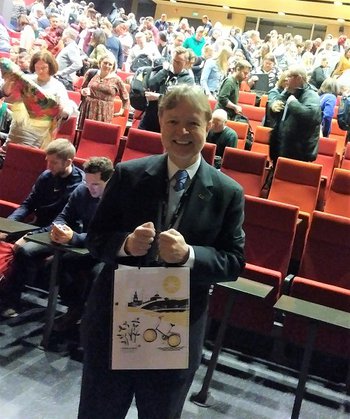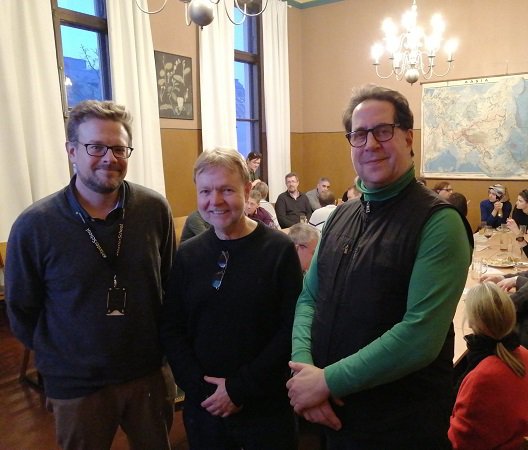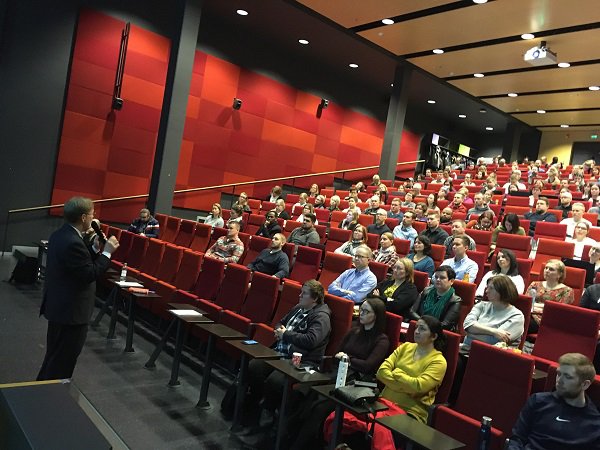
Interruption of face-to-face instruction does not stop collaboration, shows Fulbright Scholar John Donnellan
Dr John Donnellan travelled to Finland from the US in January 2020 to spend the spring term at Turku University of Applied Sciences (TUAS) as our first long-term Fulbright grantee. We now explore how his Fulbright scholarship and related teaching activities continue in the situation where the COVID-19 pandemic interrupted his residency in Finland.
Text: Mirva Virtanen
Main photo: Pixabay, Pete Linforth
First, let’s look back. It’s a dark and chilly January morning. Only a couple of days ago, Dr John Donnellan, Associate Professor from New Jersey City University (NJCU), has left the USA and arrived in Turku, Finland, to spend five months as a Fulbright Scholar at TUAS. In Turku, John is hosted by TUAS Master School of the Faculty of Engineering and Business where he will engage in teaching, student supervision and RDI activities during the spring of 2020. As Associate Professor and Chair of the Management Department at the NJCU School of Business, he is particularly interested in research regarding cooperative education between the US and Finland.
We are happy to have John stay at TUAS; he is the first Fulbright grantee to stay with us for an entire term. He is not completely new to Finland, as in 2017, he taught at Satakunta University of Applied Science (SAMK), Rauma, as a Fulbright grantee.
On that January morning at the TUAS campus, we arrange a meeting with John and talk about the slipperiness of the streets of Southwest Finland during the winter months. We talk about how cold it is in Pennsylvania in January, always shovelling snow, and how both countries should have a snowy winter. We talk about some of the very Finnish clichés: ice swimming and smoke sauna.
We discuss how to open a bank account in Finland, and how many sports opportunities there are in Turku since John loves sports. We discuss libraries in Finland; John is going to visit Oodi, Helsinki Central Library. We talk about city bikes in Turku and how handy they are in a city of this size where you can cycle from one end of the city centre to the other in ten or fifteen minutes. In winter, these so called Föli bikes, which are managed by the City of Turku, have studded tires to beat the slipperiness. We also talk about what John might do closer to summer during his free time: visit the Ruissalo island, a nature attraction located right by the city of Turku; take a 12-hour ferry to Sweden and spend a day in Stockholm; jump on a train to Helsinki, from where Tallinn, the capital of Estonia, is only a 2-hour ferry trip away.

We didn’t talk about the novel coronavirus COVID-19 since little did we know, at the time, that by the end of March John would be back in the US. At the time, we couldn’t predict that in March, national borders would be closed, that people are being told to isolate themselves and, in many countries, all in-person instruction is interrupted in order to fight the virus outbreak.
However, the outbreak and the measures taken to fight it do not mean that successful collaboration needs to stop. Let’s hear what John Donnellan has to say.
Planned arrival in January, sudden departure in late March
“My first feeling when I arrived in Turku was of true joy since the city was large enough to make the native New Yorker in me feel at home,” John describes his arrival in January.
“During my stay at TUAS, my teaching assignments and lectures were geared toward various tracks within the master’s programmes in the field of business at both TUAS and Novia University of Applied Sciences. I focused on business management, financial planning, financial management, entrepreneurial business, negotiation and presentation skills and strategic thinking and management. These programmes had a very different structure than the master’s programme at NJCU.”

However, upsetting news started travelling from China already in January. And in the end, the situation escalated extremely quickly elsewhere in the world in mid-March. On 19 March, the U.S. State Department issued a Global Level 4 Travel Advisory, the highest level, instructing all Americans abroad either to return to the United States or prepare to shelter in place.
John’s decision was to return to the US. “Since I have three children living in ‘ground zero’ NYC, it was my responsibility as a father to immediately return home. The logistical issues of travel were next to impossible since all flights were cancelled, but through persistence, I eventually made it on a plane out of Frankfurt to USA.”
Safety of Fulbright grantees above all
The Fulbright Finland Foundation started to monitor the situation once the news about the novel coronavirus started spreading from China in early 2020 and was very transparent with all grantees.
“The Fulbright Finland Foundation is deeply committed to all American and Finnish Fulbright grantees during this challenging period,” says David Yoken, Senior Lecturer at TUAS who also serves as the Vice-Chair of the Fulbright Finland Foundation Board of Directors.
“An extensive emergency action plan is an important part of the Foundation’s overall working agenda. The Foundation rapidly went online via ZOOM video conferencing with all grantees as the pandemic developed. Although there was no specific play book for COVID-19, members of the Foundation assembled an active relationship regarding the appropriate steps forward with the Fulbright American Grantees here in Finland as well as the Fulbright Finnish grant recipients in the USA.”
This included communicating the most up-to-date information from various institutional partners in Finland and the United States and advising the grantees regarding their options during the coronavirus situation. The Fulbright Finland Foundation continues to update the grantees on both sides of the Atlantic, whether they have remained with their host institutions or returned home, like John Donnellan.
Online environment suits agile, resourceful and creative schools
In Dr John Donnellan’s case, leaving Finland did not mean goodbye to teaching at TUAS. What started as face-to-face teaching now takes place online, despite the 7-hour time difference.
“I am going to continue to teach and participate in classes through the end of the spring semester. There were very few challenges in transitioning from a face-to-face class to fully online,” John says. “I am online certified and had been doing this at NJCU School of Business. Also, TUAS students and faculty were flexible and we had many great online conversations as all became proficient in Zoom and Teams online learning platforms.”
According to John Donnellan, the future of academia is going through a radical transformation with most classes being taught online in Europe and the Americas. Thus, the traditional delivery of education will change, and some schools may not be able to adjust.
“This will require utilizing the ARC model,” John suggests. “In other words, schools that are Agile, Resourceful and Creative will thrive in this environment while others that are aligned to more traditional may fail. TUAS and NJCU have seamlessly transitioned to the online environment and success should be in their future.”

Future holds further collaboration despite ongoing situation
The next steps are to establish a collaborative teaching programme with TUAS and NJCU. The programme John Donnellan has in his mind involves one NJCU teacher and one TUAS teacher jointly lecturing to teams made up of students from both institutions.
“This is a project-based learning and cultural experience for students,” John says.
According to Janne Roslöf, Head of Education and Research at TUAS Master School of the Faculty of Engineering and Business says, TUAS and NJCU seem to be a good fit in terms of future cooperation potential.
“We aim at creating the first roadmap for joint activities already during this spring,” Janne Roslöf explains. “There are significant opportunities for collaboration in different forms of teaching and learning. For example, different guest lectures and a joint course implementation can provide great mutual benefits for students. In addition, the possibilities offered by the NCJU doctoral programmes might be highly interesting to some of TUAS Master School graduates in the future.”
No one can yet predict how long the travel restrictions stay.
“I would also hope to visit Fulbright Finland and TUAS when we are able to travel since this is a long-term relationship,” John says.
However, the era of digitalization is extremely lucky in the sense that online platforms and digital tools facilitate learning, communicating and collaborating across time zones.
The application period for the TUAS-Fulbright Scholar Award is open for the academic year 2021-2022.
